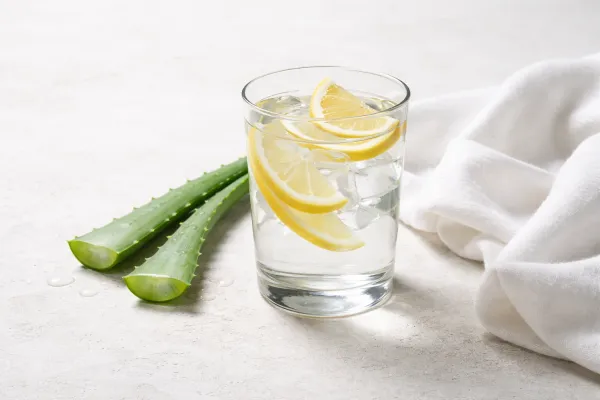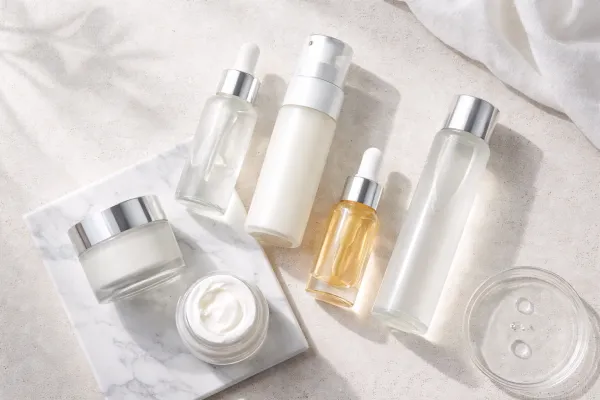Essential Skincare Routine for Dehydrated Skin: Revitalize and Restore Your Glow
Revitalize dehydrated skin with essential routines, product tips, and lifestyle changes for a glowing complexion.

If your skin often feels tight, looks dull, or has fine lines, you might be dealing with dehydrated skin. Unlike dry skin, which lacks oil, dehydrated skin is missing water.
This article will explore how to create a skincare routine that helps bring back moisture and glow to your skin.
We'll cover everything from daily routines to the right products and even some lifestyle changes you can make.
Key Takeaways
- Dehydrated skin lacks water, while dry skin lacks oil.
- Stay consistent with your skincare routine to see the best results.
- Use hydrating products like those with hyaluronic acid for better moisture.
- Don't forget to drink plenty of water and eat hydrating foods.
- Avoid harsh products that can worsen dehydration.
Understanding Dehydrated Skin

When we talk about dehydrated skin, it’s important to know that it’s not the same as dry skin.
Dehydrated skin can come and go based on our lifestyle choices and skincare routine, whereas dry skin is a consistent concern.
Let’s break it down:
Difference Between Dry and Dehydrated Skin
- Dry Skin: Lacks oil and is often flaky or rough.
- Dehydrated Skin: Lacks water, making it feel tight and look dull.
Common Signs of Dehydrated Skin
Here are some signs that our skin might be dehydrated:
- More visible fine lines and wrinkles.
- Dull complexion that lacks radiance.
- Skin that feels tight or itchy.
Causes of Dehydrated Skin
Dehydrated skin can be caused by several factors:
- Not drinking enough water.
- Spending too much time in dry or cold environments.
- Using harsh skincare products that strip moisture.
Remember, keeping our skin hydrated is just as important as moisturizing it!
Daily Skincare Routine for Dehydrated Skin

Taking care of our skin is super important, especially when it’s feeling thirsty. Here’s how we can keep our dehydrated skin happy and glowing!
Morning Routine Essentials
- Start with a gentle cleanser to wash away any overnight grime. We want to wake up our skin without stripping it of moisture.
- Next, apply a hydrating serum. This is where we can really boost our skin’s hydration levels!
- Don’t forget to finish with a lightweight moisturizer. This helps lock in all that good stuff we just put on.
- And of course, sunscreen is a must! Protecting our skin from the sun is key to keeping it healthy.
Evening Routine Must-Haves
- Cleanse again to remove the day’s buildup. A rich hydrating cleanser works wonders here.
- Apply a repairing serum packed with vitamins A, C, and E. This helps our skin recover overnight.
- Finish off with an intensive night cream. This is when our skin does a lot of its healing, so let’s give it the best chance!
- Optional: Treat yourself to an overnight hydrating mask for that extra boost.
Importance of Consistency
Sticking to our routine is crucial. Consistency is key for maintaining skin health and radiance. If we keep up with these steps daily, we’ll see our skin transform over time!
Remember, our skin is like a sponge; it needs regular hydration to stay plump and happy!
By following these simple steps, we can help our dehydrated skin feel revitalized and restore that beautiful glow we all want!
Choosing the Right Products
When it comes to taking care of our dehydrated skin, picking the right products is super important. We want to make sure our skin gets the hydration it needs!
Here are some essentials we should look for:
Hydrating Cleansers
- Look for gentle, hydrating cleansers that won’t strip our skin of its natural oils.
- Avoid foaming cleansers that can be too harsh.
- Creamy or oil-based cleansers are great options.
Moisturizers with Hyaluronic Acid
- Hyaluronic acid is a superstar ingredient that helps our skin hold onto moisture.
- Choose moisturizers that list hyaluronic acid as one of the top ingredients.
- Look for products that also contain glycerin for added hydration.
Serums and Oils for Extra Hydration
- Serums can penetrate deeper into our skin, so they’re a great addition.
- Oils can lock in moisture and give our skin a nice glow.
- Consider using a facial oil that contains nourishing ingredients like jojoba or rosehip oil.
Remember, the right products can make a huge difference in how our skin feels and looks. Let’s keep our skin happy and hydrated!
Product Type | Key Ingredients | Benefits |
|---|---|---|
Hydrating Cleanser | Aloe Vera, Glycerin | Cleans without drying |
Moisturizer | Hyaluronic Acid, Ceramides | Locks in moisture |
Facial Oil | Jojoba Oil, Rosehip Oil | Nourishes and adds glow |
By choosing the right products, we can really help our dehydrated skin feel revitalized and glowing!
Lifestyle Changes to Improve Skin Hydration

Drinking Enough Water
Staying hydrated is super important for our skin!
We should aim for at least eight glasses of water a day.
This helps keep our skin looking fresh and plump. Here’s a quick tip: drink a glass of water before meals to help with digestion and hydration.
Eating Water-Rich Foods
Incorporating water-rich foods into our diet can really boost our skin’s hydration. Foods like nuts, seeds, avocados, and oily fish can have a positive effect on the overall hydration levels of the skin.
Here’s a quick list of great options:
- Cucumbers
- Watermelon
- Oranges
- Strawberries
Using a Humidifier
Using a humidifier, especially in dry seasons, can help keep the air moist. This is great for our skin because it prevents moisture loss.
Let’s make it a habit to run a humidifier at night! It can make a big difference in how our skin feels in the morning.
Remember, small changes in our daily routine can lead to big improvements in our skin’s hydration!
Advanced Treatments for Dehydrated Skin

When our skin feels parched, sometimes we need to go beyond our daily routine. Advanced treatments can really help revive our skin's hydration levels. Here are some options we can consider:
Chemical Peels
Chemical peels are a fantastic way to refresh our skin. They work by removing the top layer of dead skin cells, which can block moisture from getting in. This helps our skin absorb hydrating products better.
Here’s what we can expect:
- Removes dead skin cells
- Stimulates collagen production
- Improves texture and tone
Mesotherapy
Mesotherapy is another cool option. This treatment involves tiny injections of vitamins and hyaluronic acid directly into our skin. It’s like giving our skin a drink from the inside out! Benefits include:
- Deep hydration and rejuvenation
- Smoother and plumper skin texture
- Improved elasticity
Hydrating Masks and Overnight Treatments
After any intensive treatment, we should keep our skin hydrated. Using hydrating masks or overnight treatments can help maintain that glow. Look for masks with ingredients like aloe vera and honey. They’re great for calming and nourishing our skin.
Remember, taking care of our skin is a journey. With the right treatments, we can keep our skin looking fresh and vibrant!
Common Mistakes to Avoid
When it comes to keeping our skin hydrated, we often trip over some common mistakes. Let’s break down a few of these so we can keep our skin looking its best!
Over-Exfoliating
Exfoliating is great, but too much can be a real problem. We need to remember that our skin has a barrier that protects it. If we scrub too hard or too often, we can strip away that barrier, leading to more dehydration.
Here’s a quick guide:
Frequency | Recommended Action |
|---|---|
Daily | Avoid exfoliating; stick to cleansing |
2-3 times a week | Use gentle exfoliants |
Once a week | Consider stronger exfoliants |
Using Harsh Cleansers
We might think that strong cleansers will do the trick, but they can actually make things worse. Gentle, hydrating cleansers are the way to go.
They help keep our skin’s moisture intact while still getting rid of dirt and oil.
Skipping Sunscreen
This is a biggie! Sunscreen isn’t just for sunny days. It’s essential every day, rain or shine. UV rays can cause our skin to lose moisture, leading to dehydration. So, let’s make it a habit to apply sunscreen every morning, no excuses!
Remember, taking care of our skin is a journey, not a race. Let’s be kind to our skin and avoid these common pitfalls!
Natural Remedies for Hydrated Skin

Aloe Vera and Honey Masks
Using aloe vera and honey together is a fantastic way to hydrate our skin.
These natural ingredients can soothe and moisturize our skin effectively. Just mix equal parts of aloe vera gel and honey, apply it to our face, and let it sit for about 20 minutes before rinsing off. This mask not only hydrates but also helps in healing any irritation.
DIY Hydrating Serums
Creating our own hydrating serum is super easy! We can combine a few drops of essential oils like jojoba or argan oil with a carrier oil. This blend can deeply moisturize our skin and lock in hydration. Just remember to do a patch test first to avoid any reactions!
Benefits of Facial Oils
Facial oils are a game-changer for dehydrated skin. They provide an extra layer of moisture and can be used day or night.
Look for oils that are lightweight and absorb quickly, like rosehip or marula oil.
Applying a few drops after our moisturizer can really boost hydration.
Keeping our skin hydrated is essential for a healthy glow. Let’s embrace these natural remedies to keep our skin looking fresh and vibrant!
Wrapping It Up: Your Path to Hydrated Skin
So there you have it!
Taking care of dehydrated skin doesn’t have to be a chore. Just remember to keep it simple: drink plenty of water, use a good moisturizer, and be gentle with your skin.
With the right products and a little TLC, you can bring back that healthy glow in no time. Don’t forget to listen to your skin and adjust your routine as needed. Happy hydrating!
Frequently Asked Questions About Dehydrated Skin
1. What is the difference between dry skin and dehydrated skin?
Dry skin lacks oil and is characterized by flakiness and roughness. Dehydrated skin, on the other hand, lacks water and feels tight and appears dull. While dry skin is a skin type, dehydrated skin is a condition that can affect anyone and can be temporary. When your skin barrier is compromised, you may experience: Dryness and flakiness, Sensitivity to products or environmental factors, Increased redness or irritation, More frequent breakouts or infections. These are clear signs that your protective barrier becomes less effective, leaving your skin vulnerable to damage and unpleasant conditions.
2. What causes dehydrated skin?
Dehydrated skin can be caused by a variety of factors including: Insufficient water intake, Exposure to dry or cold environments, Use of harsh skincare products that strip the skin of its natural oils, Excessive consumption of alcohol or caffeine. Common causes of skin barrier damage include: Over-exfoliation or using harsh cleansers, Sun damage or extreme weather, Allergens and irritants from products, Certain medical conditions like atopic dermatitis. These factors weaken the barrier, making the skin prone to sensitivity, infections, and dehydration. Your lifestyle choices can make or break your skin barrier. Besides using the right moisturizer, several lifestyle factors can support barrier repair: Healthy Diet: Eat a balanced diet rich in omega-3 fatty acids, Hydration: Drink plenty of water.
3. What are the signs of dehydrated skin?
Common signs of dehydrated skin include: Increased visibility of fine lines and wrinkles, A dull complexion lacking radiance, Tightness or itchiness, Darker under-eye circles. When your skin barrier is compromised, you may experience: Dryness and flakiness, Sensitivity to products or environmental factors, Increased redness or irritation, More frequent breakouts or infections. These are clear signs that your protective barrier becomes less effective, leaving your skin vulnerable to damage and unpleasant conditions. Signs of an imbalanced skin pH include: Excessive dryness or flaking, Redness and irritation, Increased sensitivity, Breakouts or acne, Tightness or discomfort after cleansing.
4. What can I do to improve my skin's hydration?
You can improve your skin's hydration by: Drinking plenty of water: Aim for eight glasses a day, Eating water-rich foods: Fruits and vegetables like cucumbers and watermelon are great choices, Using a humidifier: This is especially helpful in dry environments, Following a consistent skincare routine: This should include gentle cleansing, hydrating serums, and moisturizers. While your diet won't directly alter your skin's pH, it can impact your overall health, which in turn affects your skin. A balanced diet rich in antioxidants, vitamins, and essential fatty acids supports healthy skin function. Staying hydrated by drinking plenty of water is also crucial. Besides using the right moisturizer, several lifestyle factors can support barrier repair: Healthy Diet: Eat a balanced diet rich in omega-3 fatty acids, Hydration: Drink plenty of water. A diet rich in whole, healthy foods provides your skin with the nutrients it needs to repair itself. Conversely, a diet high in processed foods, sugar, and unhealthy fats can contribute to inflammation and weaken your skin barrier.
5. What ingredients should I look for in skincare products for dehydrated skin?
Key ingredients to look for include: Hyaluronic acid: This powerful humectant attracts and holds moisture, Glycerin: Another humectant that helps keep the skin hydrated, Aloe vera: Known for its soothing and moisturizing properties, Ceramides: Help to repair and strengthen the skin's barrier, Jojoba oil: A nourishing oil that mimics the skin's natural sebum. What's the Difference Between Hydration and Moisturization, and Why Do I Need Both? Hydration is about increasing the water content of your skin, while moisturization is about preventing that water from escaping. Think of it like this: hydration is like filling a bucket with water, and moisturization is like putting a lid on it to keep the water from evaporating. Hyaluronic acid is a great hydrator, while ceramides, fatty acids, and occlusive ingredients like shea butter and dimethicone help to moisturize and seal in that hydration. You need both for optimal skin barrier repair.
6. Are there any advanced treatments for severely dehydrated skin?
Yes, options like chemical peels and mesotherapy can provide intense hydration and skin rejuvenation. Chemical peels: Remove the top layer of dead skin cells, allowing for better absorption of hydrating products. Mesotherapy: Delivers vitamins and hyaluronic acid directly into the skin via micro-injections. Limit exfoliation to 2-3 times a week. Over-exfoliating can cause redness, dryness, and increased breakouts. Opt for gentle chemical exfoliants rather than harsh physical scrubs. It depends on your skin type and the type of exfoliant you're using. Generally, 1-3 times per week is a good starting point. If you have sensitive skin, start with once a week and gradually increase as tolerated. Avoid over-exfoliating, which can cause irritation. Harsh exfoliating, whether with physical scrubs or chemical exfoliants, can strip away the skin barrier, leading to dryness, irritation, and increased sensitivity. It's like taking a sandblaster to your skin's protective wall. Exfoliate gently and in moderation, no more than 1-2 times per week.
7. What are some common mistakes to avoid when treating dehydrated skin?
Over-exfoliating: This can damage the skin's protective barrier, leading to further dehydration, Using harsh cleansers: Opt for gentle, hydrating formulas that won't strip your skin's natural oils, Skipping sunscreen: Sun exposure can dehydrate the skin. Harsh exfoliating, whether with physical scrubs or chemical exfoliants, can strip away the skin barrier, leading to dryness, irritation, and increased sensitivity. It's like taking a sandblaster to your skin's protective wall. Exfoliate gently and in moderation, no more than 1-2 times per week. Avoid over-exfoliating to prevent further skin damage. Stick to a simple, gentle routine until your barrier heals. Because many beauty products contain preservatives, chemicals or fragrances that could irritate or dry out your skin, it's a good idea to introduce new products one at a time. Introducing too many new products at once can overwhelm your skin and cause further irritation. Avoid harsh cleansers and over-exfoliation.
8. What are some natural remedies for dehydrated skin?
Consider these natural options: Aloe vera and honey masks: Soothe and moisturize the skin, DIY hydrating serums: Create a blend of essential oils like jojoba or argan oil with a carrier oil, Facial oils: Provide an extra layer of moisture. Look for lightweight, quick-absorbing oils like rosehip or marula oil. However, beware of products labeled "unscented," as many of these contain masking fragrances that can still irritate your skin. Because many beauty products contain preservatives, chemicals or fragrances that could irritate or dry out your skin, it's a good idea to introduce new products one at a time. If you have sensitive skin, Dr. Khetarpal recommends using a pea-sized dot of product behind your ear, along your jawline, and waiting a day or two to make sure your skin doesn't react before applying it to your whole face. Just because something is natural doesn't mean you can't be allergic to it.




